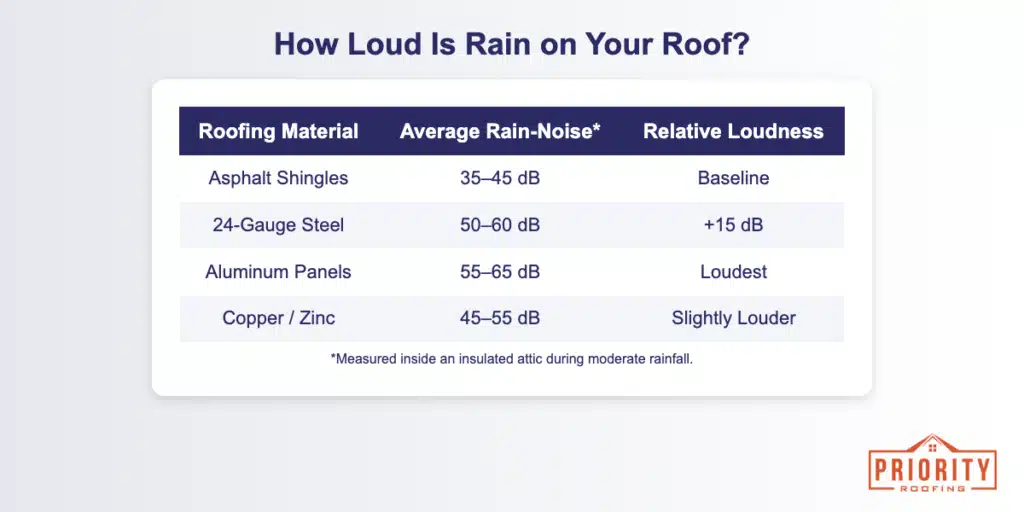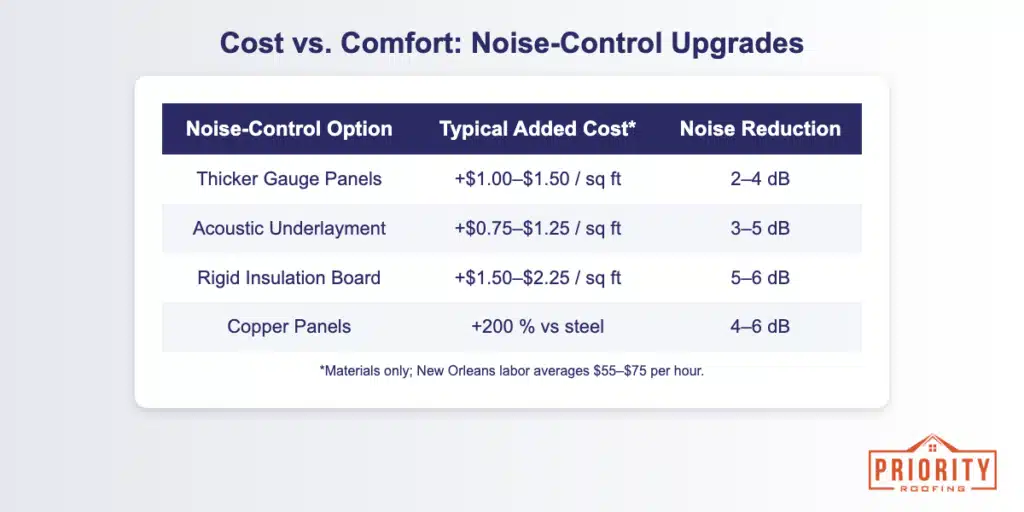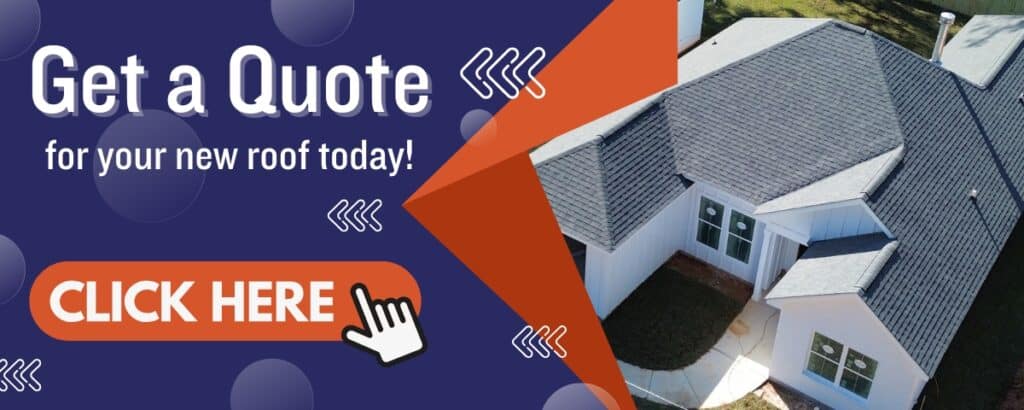Does a Metal Roof Make Noise When it Rains?
Yes, metal roofs do make noise when it rains. The sound can range from a gentle patter to a more pronounced drumming, depending on factors like rain intensity, roof design, and underlying insulation. However, for homeowners in New Orleans considering a durable metal roof, there are effective strategies to reduce the sound of rain to a comfortable level.
When deciding whether a metal roofing system is for you, the sound of the rain hitting the metal roof is a crucial factor that’s often overlooked. It might not seem like a big deal initially, but many homeowners experience buyer’s regret over something as simple as persistent rain noise. After investing tens of thousands of dollars, the last thing you need is a sound that makes you regret your choice.
By the end of this article, you’ll have clear answers to your questions: Do metal roofs make noise when it rains? How loud are they compared to shingle or tile roofs? And most importantly, what design choices and upgrades can quiet the racket? You’ll know whether a metal roof is right for you—and how Priority Roofing can help you achieve a beautiful, quiet, and long-lasting metal roof for your New Orleans home.
Understanding the Rain Sound on Metal Roofs
Metal is less porous than asphalt shingles or cedar shakes, meaning it reflects sound rather than absorbing it. The exact noise level you experience from the rain sound on your metal roof depends on several key factors:
Factors Influencing Noise Level
Rain Intensity
- Light drizzle: Often described as a soft tapping, similar to leaves rustling or a gentle popping sound. Many homeowners find this soothing.
- Steady rain: Sounds like rhythmic beads hitting a tin surface, a more consistent patter.
- Downpour: Can create a muffled, continuous drumroll that echoes through open attic spaces. This is where the concern about a noisy metal roof typically arises. Of course, in New Orleans, we’re no strangers to heavy rainfall, so this factor deserves serious consideration.
Home Design & Structure
- Attic Insulation: A well-insulated attic space above the ceiling plays a significant role in dampening noise. Thick blown-in cellulose or fiberglass batts can reduce perceived decibels by 10–15 dB, serving as a crucial barrier against metal roof noise.
- Floor Level: The bottom floor of a two-story house is generally quieter than the upper floors, as the intervening structure and additional insulation absorb some of the sound. Vaulted ceilings or cathedral designs, conversely, can allow noise to travel farther, potentially amplifying the sound.
Metal Type & Thickness
- Aluminum: Generally, the loudest metal because it’s lighter, thinner, and more susceptible to vibrations.
- Steel: A good choice for dampening sound as it’s denser and thicker than most other metal roofing materials.
- Copper and Zinc: These metals are heavier, denser, and less resonant than aluminum or steel, making them more effective at absorbing sound. While highly effective for noise reduction, copper and zinc are significantly more expensive and are typically chosen for their aesthetic appeal rather than solely for sound dampening in residential applications in New Orleans.
- Panel Thickness: Regardless of metal type, thicker gauge panels (e.g., 24-gauge steel vs. 29-gauge) absorb sound better and vibrate less, contributing to a quieter roof.
How Loud is a Metal Roof Compared to Other Materials?
It’s common to wonder, “Is a metal roof louder than shingles?” The answer is generally yes. Compared to other roofing materials, such as asphalt shingles, synthetic, or cedar shakes, metal roofing tends to be louder because it reflects sound rather than absorbing it as effectively.
Here’s a comparison of average rain-noise levels:

| Roofing Material | Average Rain Noise* | Relative Loudness |
|---|---|---|
| Asphalt Shingles | 35–45 dB | Baseline |
| 24-Gauge Steel | 50–60 dB | +15 dB |
| Aluminum Panels | 55–65 dB | Loudest |
| Copper / Zinc | 45–55 dB | Slightly Louder |
*Measured inside an insulated attic during moderate rainfall.
To put this into perspective, a 10 dB increase sounds roughly twice as loud to the human ear. This means an unmodified metal roof can feel up to four times louder than an asphalt shingle roof during a storm. Understanding the decibels of metal roof noise is key to setting realistic expectations.
Proven Solutions to Reduce Metal Roof Rain Noise
While you can’t completely eliminate the sound of rain on your metal roof, there are several highly effective strategies to dampen it and ensure a comfortable living environment significantly. Priority Roofing specializes in implementing these solutions to provide you with a quiet metal roofing system.
Upgrade the Underlayment
Installing a high-quality, peel-and-stick acoustic membrane is one of the most effective ways to reduce noise. This specialized roof underlayment for sound acts like a shock absorber between the metal panels and the roof decking. It significantly reduces vibrations and sound transmission, making a noticeable difference in interior noise levels. This additional layer also provides excellent protection against leaks.
Add Rigid Insulation Boards
You can upgrade your solid roof decking to absorb even more sound by installing wood-fiber or poly-iso insulation boards between the metal panels and the roof decking. These boards add another substantial layer through which sound must travel, effectively acting as a metal roof noise insulation barrier. When combined with solid roof decking and your ceiling insulation, these boards can drop interior noise by up to 6 dB. Beyond sound absorption, they also enhance energy efficiency and help prevent condensation.
Choose Denser Metals or Thicker Gauge Steel
If your budget allows, opting for denser metals like copper or zinc, or choosing thicker gauge steel panels (e.g., 24-gauge instead of 29-gauge), can inherently reduce vibration and sound without requiring additional labor. These materials are less resonant and more effective at absorbing sound energy, making them the best metal for noisy roof concerns. For instance, the steel roof noise level is typically lower than that of aluminum.
Ensure Solid Roof Decking
To minimize noise, it’s crucial that your roof decking is solid and properly maintained. A metal roof installed over solid wood decking will be significantly quieter when it rains compared to an open-batten system. The solid wood creates a tight “sandwich” effect between your metal panels and the attic space, reducing the “drum effect” common with less robust installations. Without a solid foundation, your ceiling insulation would be the only barrier absorbing sound.
Verify Attic Insulation & Ventilation
A well-insulated attic floor (R-38 or higher is recommended for our humid Gulf Coast climate) plays a vital role in muffling exterior noise. This dense layer of insulation absorbs sound waves before they can penetrate your living space. Proper ventilation also contributes to the overall health of your attic, which can indirectly support the integrity of your sound-dampening layers.
Avoid Post-Installation “Sound-Deadening” Paints
While some rubberized top coats claim to reduce sound, real-world gains are often modest and short-lived. These coatings are applied post-installation and, unlike the painted finish applied during manufacture, may not offer the long-term, significant metal roof rain noise reduction you’re looking for. We recommend focusing on construction-grade solutions like those listed above first, as they provide more reliable and lasting results.
Cost vs. Comfort: Is a Quieter Metal Roof Worth the Investment?
Investing in sound-dampening upgrades for your metal roof is an investment in your home’s comfort and value. Here’s a look at typical added costs and their noise reduction benefits:

| Noise-Control Option | Typical Added Cost* | Noise Reduction |
|---|---|---|
| Thicker Gauge Panels | +$1.00–$1.50 / sq ft | 2–4 dB |
| Acoustic Underlayment | +$0.75–$1.25 / sq ft | 3–5 dB |
| Rigid Insulation Boards | +$1.50–$2.25 / sq ft | 5–6 dB |
| Copper Panels | +200% vs steel | 4–6 dB |
*Materials only; typical New Orleans labor averages $55–$75 per hour.
For most homeowners, pairing acoustic underlayment with standard 24-gauge steel strikes the best balance of quiet and cost, offering significant dampening of metal roof rain effects without breaking the bank. The long-term comfort and peace of mind often outweigh the initial investment.
Beyond Noise: The Enduring Benefits of a Metal Roof
Despite concerns about metal roof noise complaints, metal roofing has continued to grow in popularity, and for good reason. The benefits of metal roofing often far outweigh any noise from rain, especially when sound-dampening measures are in place.
- Longevity: Metal roofs boast an impressive service life of 40 years or more, even in hurricane-prone areas like New Orleans. This makes them a truly long-term investment.
- Wind Resistance: Properly installed metal panels are engineered to withstand extreme winds, often up to 140 mph gusts, providing superior protection during severe weather.
- Energy Savings: Cool-roof coatings reflect solar heat, significantly trimming summer energy bills and keeping your home cooler.
- Insurance Perks: Many Gulf Coast insurance carriers offer discounts for metal roofs because they consistently outperform shingles in severe weather conditions, offering an additional financial incentive.
- Durability & Low Maintenance: Metal roofs are incredibly durable, resistant to rot, insects, and fire, and require minimal maintenance over their lifespan.
If a bit of rain chatter doesn’t bother you—or you’re willing to invest in sound-dampening upgrades—metal may still be your smartest long-term move for a resilient, energy-efficient, and beautiful home.

Final Takeaway & Your Next Step: Get a Quiet Metal Roof in New Orleans
A metal roof will make noise when it rains. Whether that’s a soothing lullaby or an unwelcome racket depends on panel choice, installation method, and your sound tolerance. By investing upfront in thicker panels, acoustic underlayment, and solid decking, you can cut the clatter to a comfortable level.
Don’t let concerns about rain sound keep you from investing in a durable, beautiful metal roof. Priority Roofing offers FREE, no-obligation roof inspections and consultations. Our New Orleans roofing specialists understand the unique challenges of metal roofs in our climate and are experts in providing noisy metal roofing solutions. We can assess your home, discuss your noise concerns, and recommend the ideal metal roofing system for your peace of mind.
Call Priority Roofing today at (504) 810-5346 or Request Your Free Quote Online! We’re ready to help you make the smart choice for your home.

